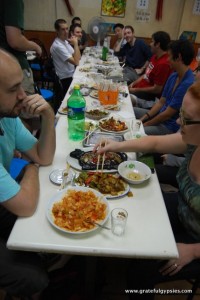Don’t Go Hungry – How to Order in Chinese Posted by sasha on Jul 2, 2014 in Culture, Vocabulary
We have to eat in order to survive. Perhaps that’s why food-related language is always at the top of any new learner’s to do list. When I first got to China and realized how little English was spoken and how it was virtually non-existent in restaurants, I quickly realized that I had to either learn restaurant Chinese or go hungry. Thankfully, ordering in a Chinese restaurant is much easier than in a Western one. Western manners and politeness really complicate things, and my Chinese students always struggle with the “In a Restaurant” lessons. Casual small talk and friendliness between waiters and customers is something that simply doesn’t happen in the Middle Kingdom. As with many things in China, ordering food is straight and to the point. Here are some tips and some useful phrases to ensure you don’t go hungry in China:
Getting a Table

Sometimes you sit outside in the street in China.
When you enter a restaurant, you’ll almost always be greeted with the same question:
“How many people are in your group?”
(你们几位? – nǐ men jǐ wèi)
The word 位 is a measure word for people. To answer, just add the number before the character 位, for example:
“There are four people.”
(我们四位 – wǒ men sì wèi)
Getting the Waiter’s Attention
In a Western restaurant, we may politely say something like, “Excuse me. We’re ready to order.” Not so in a Chinese restaurant. Don’t worry about being polite or quiet at all. This is how it’s done in China:
“Waiter! Order food!” (服务员! 点菜! – fú wù yuán! diǎn cài!)
Seriously, that’s all you have to do. And this is not just for your hole in the wall noodle shops, either – I’ve heard Chinese people yell this even in fancy, slightly upscale Chinese restaurants. Don’t worry about offending your waiter, because this is just the way it is.
Making Your Order

All of this can be yours… if only you know how to order it!
In America, we might say things like, “Could I please have…?” or “I would like…”. Once again, doing this in China is much simpler:
“I want…” (我要 – wǒ yào)
Of course, you need to use measure words. When ordering food, one useful measure word to remember is 份 (fèn). It basically just means “an order/a dish.” For example:
“I’d like an order of Kung Pao chicken.”
(我要一份宫保鸡丁 – wǒ yào yí fèn gōng bǎo jī dīng)
Another useful measure word is 盘 (pán), meaning “plate.”
“I want a plate of dumplings.”
(我要一盘饺子 – wǒ yào yì pán jiǎo zi)
For noodles or rice, use the measure word 碗 (wǎn), meaning “bowl.”
“I want a bowl of beef noodles.”
(我要一碗牛肉面 – wǒ yào yì wǎn niú ròu miàn)
When it comes to drinks, here are a few measure words you might use:
-
bottle (瓶 – píng)
-
can (听 – tīng)
-
pot (壶 – hú)
-
cup/glass (杯 – bēi)
Take these measure words and the phrase we learned above, and try to say the following in Chinese:
-
“I want a can of Coke.”
-
“I want a bottle of beer.”
-
“I want a glass of wine.”
-
“I want a pot of green tea.”
http://www.youtube.com/watch?v=Dn87JA6gXiE
Follow along with this easy video to practice some of this language.
Special Requests

She’s smiling now, but wait til she eats this spicy hot pot!
Chinese people are known to eat just about everything, but us picky foreigners don’t like it all. Here are some phrases that might help you out in a Chinese restaurant:
“I don’t want MSG.”
(我不要味精 – wǒ bú yào wèi jīng)
“I don’t want it spicy.”
(我不要辣的 – wǒ bú yào là de)
“I don’t eat meat.”
(我不吃肉 – wǒ bù chī ròu)
Complaints
Of course, things go wrong in a restaurant sometimes. Here are some common complaints translated to Chinese:
“This isn’t what I ordered.”
(这不是我点的 – zhè bú shì wǒ diǎn de)
“I ordered some fried rice and it hasn’t arrived.”
(我点了炒饭,还没到 – wǒ diǎn le chǎo fàn, hái méi dào)
“The bill is not right.”
(帐单不对 – zhàng dān bù duì)
Getting the Bill
When eating out in the US, it can be a pain to get your bill. You have to wait to get your waiter’s attention, wait for the check, hand over your cash or card, and then wait for your change. It can be a lot easier in China. Just get ready to yell:
“Waiter! Pay the bill!”
(服务员,买单! – fú wù yuán, mǎi dān!)
You could be a little more polite if you like, though, especially if you’re eating out in one of your local spots and you already know the people there. Instead, you might simply ask:
“How much is it (in total)?
(一共多少钱? – yí gòng duō shǎo qián)
Another video about ordering in Chinese.
Of course, there’s a lot more you could learn about eating out in China and how to order, but these basics will at least ensure that you don’t starve and that you don’t have to eat in McDonald’s or KFC every day.

Build vocabulary, practice pronunciation, and more with Transparent Language Online. Available anytime, anywhere, on any device.
About the Author: sasha
Sasha is an English teacher, writer, photographer, and videographer from the great state of Michigan. Upon graduating from Michigan State University, he moved to China and spent 5+ years living, working, studying, and traveling there. He also studied Indonesian Language & Culture in Bali for a year. He and his wife run the travel blog Grateful Gypsies, and they're currently trying the digital nomad lifestyle across Latin America.




Comments:
Sthitapragnya Deshpande:
Thanks for a most informative article.
The Mandarin characters are useful.
When you get the time, could you please post the audio too? Or perhaps just a video with all the statements spoken?
Madush jayasekara:
Thanks for your help. Am very happy.